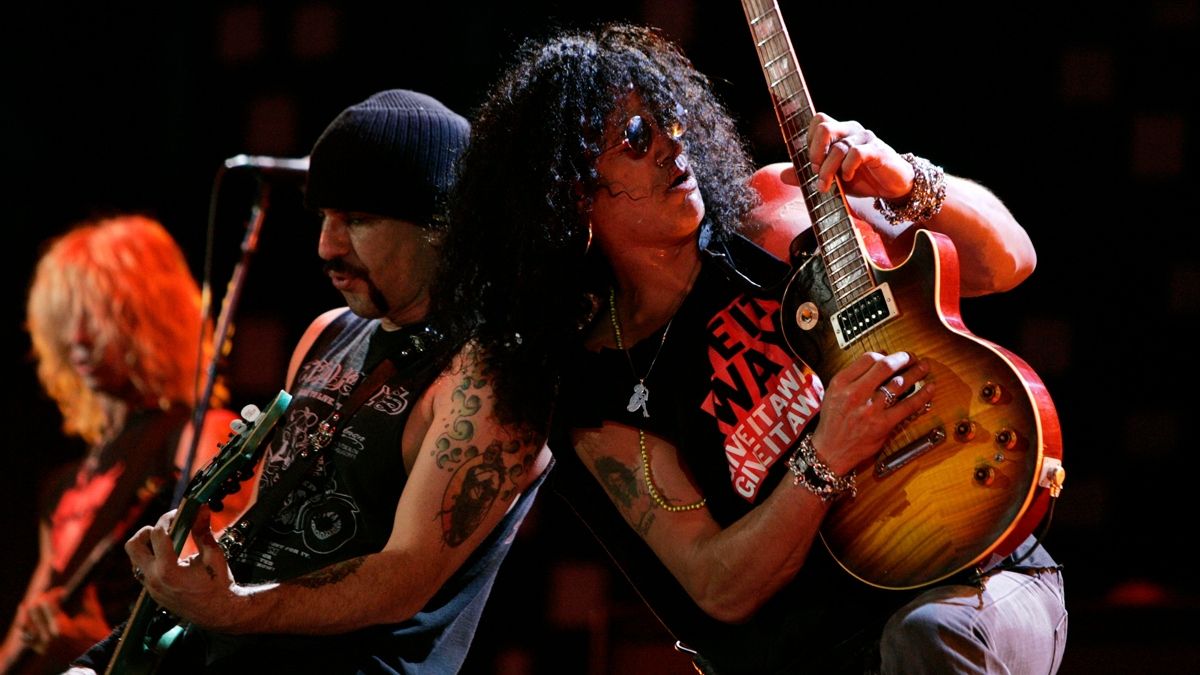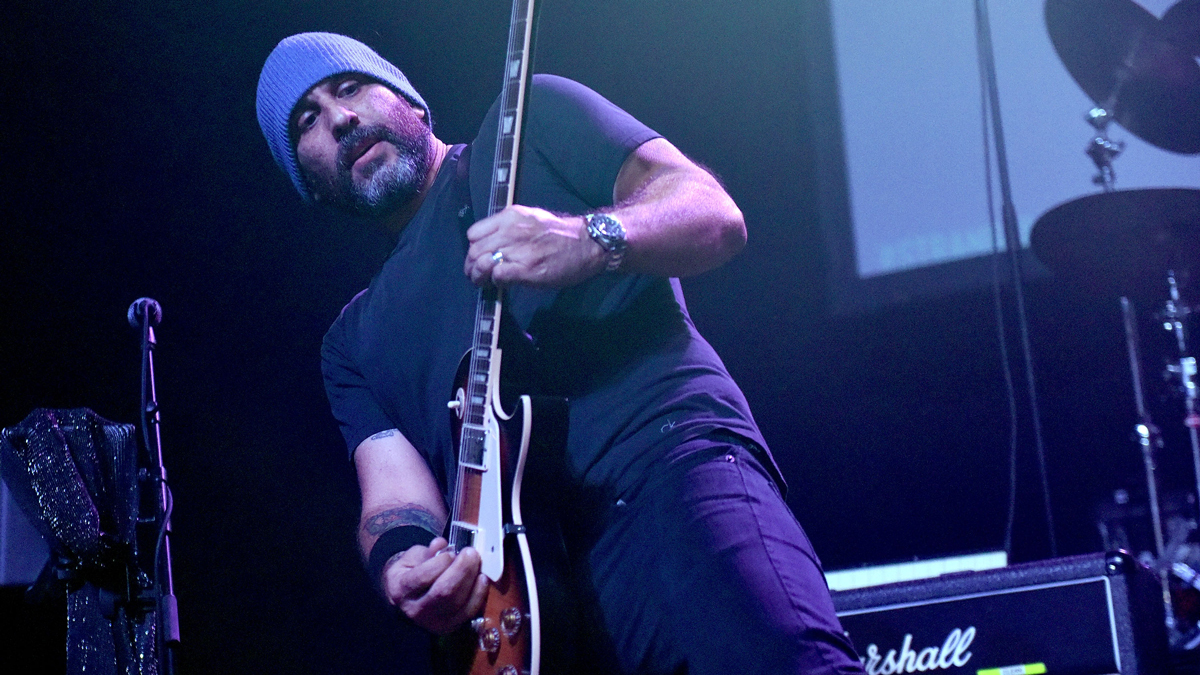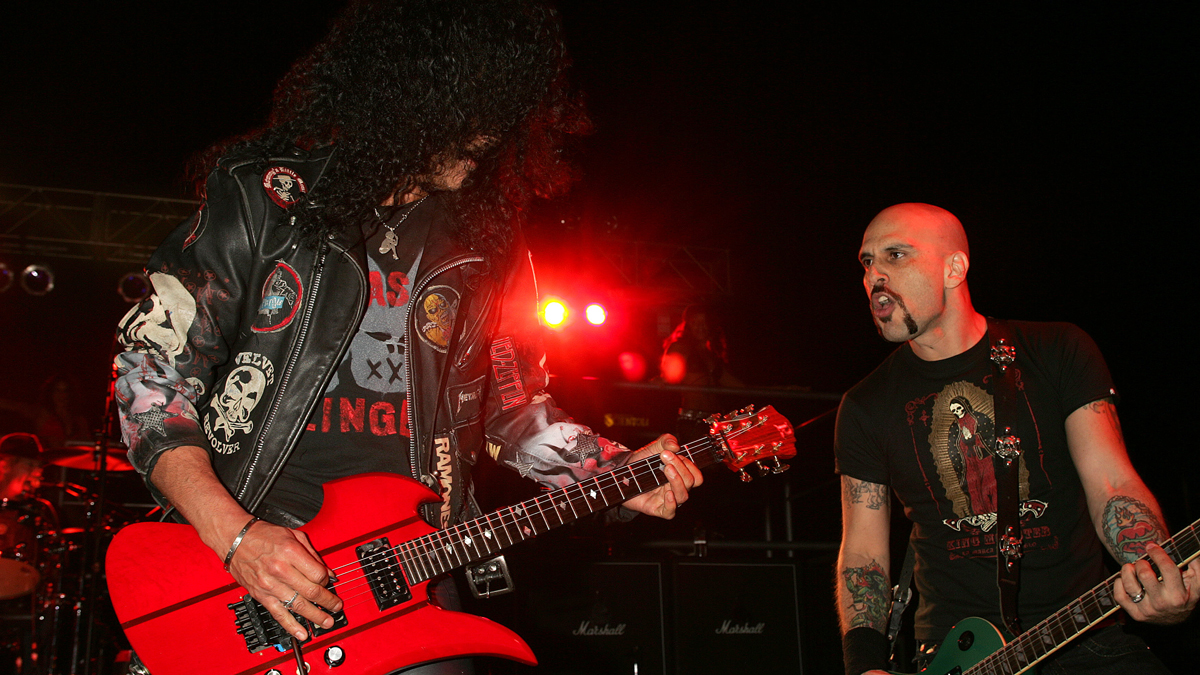“The substance issues and drama negatively impacted Velvet Revolver. But there was the ‘dangerous band’ element. That came across in a song like Slither”: Dave Kushner looks back on his guitar partnership with Slash – and writing the Sons of Anarchy theme
He went to school with Slash and joined the noughties’ biggest supergroup. But when Velvet Revolver ended, Kushner threw himself into soundtrack work with guitar as the driving force. He reflects on the band’s volatile run and how it impacted their swaggering take on rock ’n’ roll

All the latest guitar news, interviews, lessons, reviews, deals and more, direct to your inbox!
You are now subscribed
Your newsletter sign-up was successful
Dave Kushner had been in several bands before joining Velvet Revolver alongside Slash, Duff McKagan, Matt Sorum and Scott Weiland, but nothing could have prepared him for what was to come.
Sure, Wasted Youth, Electric Love Hogs, and Infectious Grooves had their cult followings, but Velvet Revolver was a runaway train. Just ask Kushner: "Not to get too deep, but there was a lot of prayer and some meditation," Kushner tells Guitar World. "I'm not a big Jesus guy, but there's something up there. But, really, the big thing for me was to try to stay grounded. To that point, I had lived a life where I knew better than to spend all my money as if it was just going to keep coming."
The music of Velvet Revolver, which combined the raggedy-assed imagery of the '80s with lionhearted guitar heroics of the '70s, was filled with bluster. But while successful, the situation was also akin to an unsuspecting boot hovering above a landmine, eager to detonate upon impact.
Looking back on it 15 years after Velvet Revolver's end, Kushner tells us, "Being in a band with Scott, and with the volatility of all the people involved, I went into it thinking, 'This all could end tomorrow; I need to make the most of it.' But Duff, who had gone to business school, said, 'Dude, you have to buy a house,' and walked me through it."
He continues, "It was a crazy situation with Scott; there were times I'd call up Robert DeLeo [of Weiland's former band, Stone Temple Pilots] and say, 'Dude, what did you do when this happened with Scott?' So, getting through this band situation far bigger than I'd been in before was a very 'it takes a village' deal. I'm glad I had the humility to ask those questions and have those conversations."
Volatility may have been par for the course within Velvet Revolver, but so was guitar-driven bombast. And Kushner – a riffsmith with a habit of playing alongside the best – was right at home.
"Most of the bands I've been in were two-guitar bands," Kushner says. "So, I was always used to that dynamic. And Slash was also used to being in a band with another guitarist. The big thing for me is to know my place and to keep my ego in check. There was no, 'Oh, I should be doing this,' or 'I need to do more of that.'"
All the latest guitar news, interviews, lessons, reviews, deals and more, direct to your inbox!
As for what's kept him in such good company, Kushner elaborates, "There's a stupid saying that goes, 'Your ego is not your amigo,' and it's so true. The truth is there are probably a ton of people who have more skill than I do, but mindset and personality count for a lot. When you put all that together, that keeps you around for more than just an album cycle."
After Velvet Revolver, you dove headfirst into soundtrack work. What brought that on?
"In 2008, Velvet Revolver came to a halt while we were looking for singers to replace Scott. We'd been doing that for maybe a year, and a friend of mine, Bob Thiele Jr., said to me, 'Hey, I just got this job with a show called Sons of Anarchy; it's not out yet, but it's like The Sopranos meets the Hells Angels.' And then he said, 'If you have any ideas for music, you should come down, and we can try and write some stuff.' I thought about it and said, 'Okay, let's give it a try,' went over to Bob's, and we wrote that main riff for the show [This Life]."
What was the inspiration behind that riff?
"The way it came about was I had written with a friend of mine, Shooter Jennings, and we had done some stuff together. When I went to Bob's, I had that type of thing in mind, along with the riff. We ended up writing the whole theme song that same day. It took us a few hours, and that was it.
"But don't get me wrong – it wasn't easy; it took fucking months before we found out if they would use it. But once that happened, the floodgates opened, and I gained momentum. So, scoring was this skill set I didn't even know I had."
How did your years of writing rock music inform your approach to scores?
"With the Sons of Anarchy thing, it was an easy transition. But with everything else, there was a learning curve to get past. I grew up listening to and playing punk and hard rock, but I also listened to other stuff like Sly and the Family Stone, Stevie Wonder, and The Ohio Players. So, I've always had an open mind regarding music, which helped me when I got into this."
Are you still using the same Fernandes guitars as your Velvet Revolver days?
It's funny; I ran into Munky at the carwash, but I'd known him since before he was in Korn, as we grew up in the same neighborhood
"I still have those guitars, but literally, as I'm talking to you now, I'm looking at this Ibanez baritone [K-7] guitar that I borrowed from Munky [James Shaffer] from Korn. I've been using that for the stuff I'm working on for Gordon Ramsey's show, Uncharted.
"It's funny; I ran into Munky at the carwash, but I'd known him since before he was in Korn, as we grew up in the same neighborhood. We got to some bullshitting, and I borrowed his baritone. It's killer."
You seem to be perpetually drawn to off-the-beaten-path guitars. Why is that?
"I don't know… I was never really a Les Paul guy, you know? I've got a bunch of guitars sitting in racks in my studio, though. I still use the Fernandes guitars for Sustainer stuff, which is cool for certain soundtrack things. It's great for layering the Sustainer things and putting effects on.
"But another cool thing is this Mike Dirnt Road Worn Precision Bass. Mike is a good friend of mine, and he gave it to me for my birthday. It's cool because it's like a regular P-Bass, but it's got this Tele-looking headstock. It's fucking amazing."
Is that your primary bass for recording?
"It's definitely my favorite, but I've got another P-Bass from Fender, and I've got a Jaguar and a Mustang bass, too. I need a lot of options because doing scores requires me to be able to get a lot of different sounds. Hell, I even have a few different ukuleles, a mandolin, and a fiddle with a small push/pull knob to get a ton of sounds out of it."

What's your methodology for good rhythm guitar?
"My approach has always been to serve the song. You have to serve the band because it's about the collective, and that trickles down to the song. It's essential to walk the line between creativity and the absence of ego. Because, sometimes, as a guitar player, especially when you know you can play leads, it's easy to say, 'Hey, check me out over here.' But when you're in the kind of bands I was in, primarily two-guitar bands, you don't want to do that. You have to have humility and be able to assess the situation."
Your chemistry with Slash seemed particularly potent. Is there a secret to that?
"I always loved his solos, and it was incredible when I got to be in the band with him. I paid close attention to what he was doing, let him do what he does so well, and then worked around that.
"But the other thing about Velvet Revolver was I wasn't only in a band with Slash; on the other side was Duff, who played so damn loud that sometimes I could barely hear Slash [laughs]. So, I played what I thought was good and fit the song."
One school of thought says that rhythm players should double the bass, which can work but can get stale. It didn't seem like you did much of that, though.
"That's true. I actually tried not to just double Duff's bass. But even if I did something unique, I didn't want it to be too unique to the point that it sounded weird. I also didn't want it to sound like I was trying to compete with what the other guys were doing, so it varied depending on the situation."
Velvet Revolver seemed to thrive off drama as much as chemistry. Would you agree that fueled the band, too?
"I think in the situation of Velvet Revolver, it definitely did. The volatility of the substance issues and the drama negatively impacted the band; there's no denying that. But, like you said, there was the 'dangerous band' element, which is something I often roll my eyes at. But with that band, it did apply.
"There was always an element of, 'Is this guy going to show up' or 'I don't know what's going to happen' present. That came across in the writing and approach to a song like Slither, for example."
How so?
"When we recorded Slither, Matt [Sorum] was getting really frustrated with all that stuff while Slash and the guys were in the room with him. So, we were playing along with Matt, and he said, 'Ah, it's too fast,' and kicked us out of the room and recorded the drums himself. I remember the guys were pissed, and Duff threw a beer bottle across the room.
"This sort of tense stuff was always happening, but that song ended up being the single and did well. Now, I can't say that without one, there wouldn't have been the other, but maybe if things were easy, we wouldn't have had that same edge."

And how would you say that situation changed you as a guitarist?
"Playing with Slash was an education in and of itself. But I've known Slash since middle school, and we also hung out in the same circles. I was always very comfortable around him, but there's no denying I looked up to him.
"But what was always so cool is that Slash is just a dude. That was never more apparent than when we were looking for singers, and people said, 'You just need to get someone.' But Slash said, 'No, it's got to be the right guy.' We waited, and it paid off.
"So, maybe more than anything, I learned to be a better band member. That's important, because when you're in a band you're sometimes a partner in a multi-million-dollar company, so there's a lot to learn."
Do you see yourself stepping into a traditional band setting again?
"If the situation were right, I would consider it. Because that's where I come from, and I love playing guitar on stage. I love being up there jumping around and messing with gear. The only thing for me is that I sometimes get bored on the road, but that's my problem.
"But I'd be game if the right situation presented itself. So, if you're out there and need a guitarist, and you want to call me, my number is… maybe I better not give that out [laughs]."
Andrew Daly is an iced-coffee-addicted, oddball Telecaster-playing, alfredo pasta-loving journalist from Long Island, NY, who, in addition to being a contributing writer for Guitar World, scribes for Bass Player, Guitar Player, Guitarist, and MusicRadar. Andrew has interviewed favorites like Ace Frehley, Johnny Marr, Vito Bratta, Bruce Kulick, Joe Perry, Brad Whitford, Tom Morello, Rich Robinson, and Paul Stanley, while his all-time favorite (rhythm player), Keith Richards, continues to elude him.

